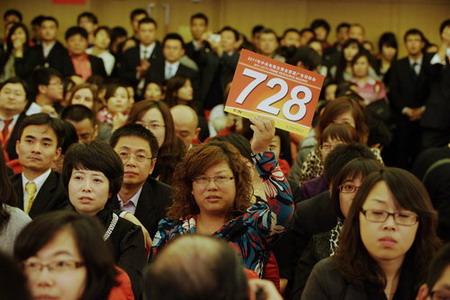Economy
Biopharmaceutical firms told better quality control holds key to global growth
By Hu Meidong and Wei Tian (China Daily)
Updated: 2010-11-09 13:29
 |
Large Medium Small |
SANMING, Fujian - The country's biopharmaceutical industry needs to tighten quality control measures and maintain its own standards to overcome barriers in overseas markets as well as secure an emerging domestic one, officials have said.
"Quality problems in food and pharmaceutical products will have a lethal effect on consumer confidence. The melamine-tainted milk scandal provided a negative example," Liu Zhanglin, deputy head of the China Chamber of Commerce for the Import and Export of Medicines and Health Products, said at the Cross-Straits BioPharmaceutical Forum on Saturday.
The global herbal product market alone is now worth nearly $83 billion, with a steady year-on-year growth rate ranging from 3 to 12 percent, industry figures showed.
The Chinese government has also listed the development of the biopharmaceutical industry as a main task in the 12th Five-Year Plan (2011-2015).
"In China, 80 percent of industry output was gained through exports, but these were mainly low-priced raw materials," Liu said.
"Meanwhile, the United States and other Western countries are raising the threshold of biopharmaceutical products by setting technological barriers."
Raw materials provided by China had accounted for half of the amount in some target markets including the United States, Europe and Japan, Liu said.
The export volume of traditional Chinese medicine (TCM) alone experienced growth for 10 consecutive years with an average increase of more than 16 percent, but it was worth just $91 million in the first six months of 2010.
In comparison, the export volume of Western medicine was 13 times larger.
Many restrictions in Western markets have also threatened China's TCM products. These include technical barriers involving heavy metals, pesticide residues and microbial limits. The "green barriers" of importing countries have blocked more than 60 percent of the TCM products, industry figures showed.
| |||||||
"For example, some of the ingredients used in traditional Chinese medicine are more likely to retain heavy metal elements. It may not meet Western standards, but it still has a good effect on patients," Liu said.
The Ministry of Commerce has entrusted his organization to draft seven standards for biomedical production, while another 13 were under discussion with industry players, he said.
"In order to achieve sustainable development, the industry should look more at the potential of the domestic market and emerging markets," he said.
With an aging society and an improving universal healthcare system, China's biomedical industry is expected to be worth 4 trillion yuan ($600 billion) by the next decade, exceeding that of Japan and Europe to become the world's second-largest pharmaceutical market.
Exports to the Association of Southeast Asian Nations (ASEAN) area recorded 41.8 percent growth after the launch of the China-ASEAN Free Trade Area in January.
Chen Chei-hsiang, director of the Biotechnology and Pharmaceutical Industries Program Office in Taiwan, said both sides of the Straits can achieve win-win cooperation in the biopharmaceutical industry.


